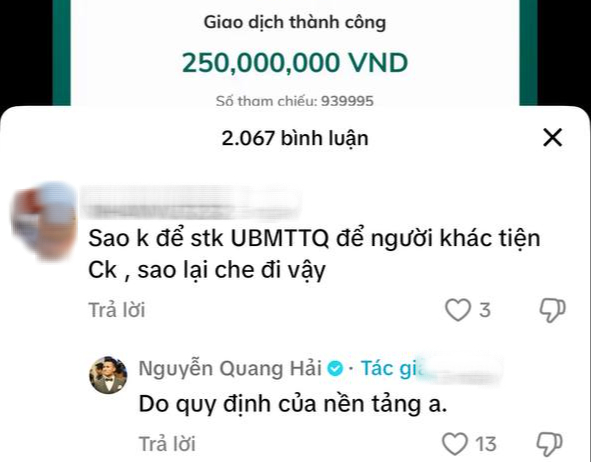▌Câu trả lời hay nhất
Thesvvv388,com city has hosted numerous events, trade shows, and workshops to enhance trade networking and support OCOP program members in marketing their products.

Representatives from government agencies, manufacturers and retailers proposed innovative solutions to enhance the marketing of OCOP (One Commune One Product) products at the online seminar entitled "Fostering OCOP products sales through supermarkets" hosted by the Economic & UrbanNewspaper today (August 26).
Ha Tien Nghi, Deputy Director of the Hanoi Agricultural Extension Sub-Department under the Department of Agriculture and Rural Development: Promoting trade strategies to increase sales of OCOP products
 |
| Ha Tien Nghi, Deputy Director of the Hanoi Agricultural Extension Sub-Department under the Department of Agriculture and Rural Development |
The OCOP program plays a pivotal role in transforming rural economies by amplifying local value and building community strength.
Hanoi recognizes that effective trade promotion is critical to the success of the OCOP program. Implementing market expansion strategies will significantly increase sales of OCOP products.
The Department has worked with the city's People's Committee to launch various activities to promote OCOP products. These initiatives have been integrated into rural development programs to showcase traditional crafts and local specialties. A series of events, fairs, and workshops have been held to facilitate trade networking and help OCOP program members market their products.
Once certified, OCOP products will be marketed through the city's product launch events in Vietnam and abroad. In addition, Hanoi has established 105 showrooms in every district of the city to ensure accessibility for consumers.
After nearly five years of implementation, 29 out of 30 districts in Hanoi have evaluated more than 2,700 OCOP products, with 6 receiving five stars. OCOP members have consistently raised the standard of their products, ensured food safety, and successfully exported a large number of goods to foreign markets.
To ensure the sustainability and expansion of the OCOP program, Hanoi has tasked the Department with enforcing government regulations. The department has also established a joint inspection team to monitor the quality of OCOP products. By the end of 2023, this team had inspected 251 OCOP program members with over 1,100 products, representing 42.3% of all certified items.
In 2024, the department will continue its monitoring efforts and will inspect 128 manufacturers of 335 OCOP products to ensure quality and foster sustainable development for the program.
Nguyen The Hiep, Deputy Director of the Hanoi Department of Industry and Trade: Collaboration enhances the distribution of OCOP products across local channels
 |
| Nguyen The Hiep, Deputy Director of the Hanoi Department of Industry and Trade |
We regularly review the list of OCOP products that qualify for the shelves of distribution channels such as supermarkets and grocery chains in cooperation with the city's Department of Agriculture and Rural Development. They also work with the Hanoi Promotion Agency to share information with businesses in the distribution network to facilitate connections and meet consumer demand.
Furthermore, there is a tremendous drive to use technology in the manufacturing and marketing of OCOP goods. This involves putting traceability systems into place and placing products on e-commerce sites.
We recommend that companies and supermarkets enter into long-term contracts to support the sale of OCOP products so that producers can be assured of supply and maintain quality.
The department also guides suppliers to create product lines that are in line with consumer preferences, prioritizing environmentally friendly packaging.
Looking ahead, the industry will continue to organize effective trade promotion activities, including trade shows, exhibitions and product weeks.
In addition to seeking media attention to raise awareness, these events will serve as a conduit for OCOP producers to interact with consumers and distribution networks.
There is also a commitment to improve the trading infrastructure, such as building supermarkets and expanding convenience stores, to create fixed locations for the exchange and sale of OCOP products. This will help businesses and cooperatives establish regular trading and expand the visibility of OCOP products throughout the city.
Distribution and retail companies also offer various support policies for producers. In particular, Central Group, MM Mega Market, and BRG are actively implementing programs to promote Hanoi's OCOP products in their distribution networks, including discounts for farmers and organizing OCOP product weeks and agricultural fairs.
Pham Thi Ly, Director of Tien Duong Organic Agricultural Cooperative: A pioneer in Vietnam's organic farming landscape
 |
| Pham Thi Ly, Director of Tien Duong Organic Agricultural Cooperative |
Tien Duong is known for being the first cooperative to obtain patented scientific research for organic farming and to offer creative microbiological solutions as a member of the Vietnam Organic Agricultural Cooperative Union.
The cooperative has four OCOP-certified products, primarily pennywort, along with herbal offerings such as yellow flower tea and other proprietary herbal varieties.
As a small cooperative, Tien Duong focuses on products that reflect local values. Located in Dong Anh District, a region known for safe vegetable production, our commitment to local development is evident in our emphasis on leafy greens. However, with Dong Anh's transition to an urban district, we face challenges as all of our vegetable growing areas are subject to urban planning regulations.
After revitalizing the soil, Tien Duong's products have received positive feedback from consumers. At present, our production meets local demand qualitatively but not quantitatively, as we face difficulties in expanding our cultivation area due to urban development constraints.
This year, we have partnered with Soc Son District and the northern province of Thai Nguyen to secure a stable growing source, ensuring consistent supply and quality for their products.
Phan Uyen, Sales Manager at Ba Vi Golden Cow Milk Joint Stock Company: recommendations regarding how supermarkets might help promote local products.
 |
| Phan Uyen, Sales Manager at Ba Vi Golden Cow Milk Joint Stock Company |
We have over ten products that have achieved a four-star OCOP certification, with standout items like milk cakes and yogurt.
However, we face significant challenges in gaining visibility. Despite high quality and competitive pricing, our marketing efforts are largely limited to traditional channels, which hinders brand awareness.
We currently sell primarily through small retail outlets and have yet to penetrate supermarket chains. Barriers to entry include the costs associated with barcode registration and the requirement for consignment sales, which are challenging for a small company like ours. Access to supermarket shelves would greatly increase brand awareness and sales.
We suggest that supermarkets adopt policies that support the cost of barcode registration and allow prepayment for goods on delivery as a means of addressing these issues.
Dam Van Dua, Director of Dong Cao Service Cooperative: Requesting support for proper labeling of products
 |
| Dam Van Dua, Director of Dong Cao Service Cooperative |
The cooperative owns 200 hectares of land, and we produce 60,000 tons of vegetables annually. Despite the presence of modern supermarkets in Hanoi, we primarily sell our produce through traditional market traders in the city and neighboring provinces. On average, we deliver about 40 tons per day, which can rise to 400 tons per day during peak holiday seasons.
However, selling OCOP-certified vegetables in supermarket systems has been challenging, particularly in terms of storage and transportation.
To increase our market presence, we are working with a South Korean company to process our products to export standards. We are also seeking support from regulatory agencies to find international partners who specialize in processing. In addition, I hope that the media will help promote our OCOP products.
The cooperative is also requesting assistance from the Hanoi Department of Industry and Trade to properly label our OCOP products when they enter the retail system so that we can prove their origin.











